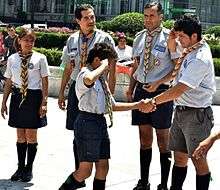Ceremony



A ceremony (UK /ˈsɛrɪməni/, US /ˈsɛrəˌmoʊni/) is an event of ritual significance, performed on a special occasion. The word may be of Etruscan origin, via the Latin caerimonia.[1]
Ceremonial occasions
A ceremony may mark a rite of passage in a human life, marking the significance of, for example:
- birth
- initiation (college orientation week)
- puberty
- social adulthood (Bar (or Bat) Mitzvah)
- graduation
- awarding
- retirement
- death (Day of the Dead)
- burial (funeral)
- spiritual (baptism, communion)
Celebration of events
Other, society-wide ceremonies may mark annual or seasonal or recurrent events such as:
- vernal equinox, winter solstice and other annual astronomical positions
- weekly Sabbath day
- inauguration of an elected office-holder
- occasions in a liturgical year or "feasts" in a calendar of saints
- Opening and closing of a sports event, such as the Olympic Games
Other ceremonies underscore the importance of non-regular special occasions, such as:
- coronation of a monarch
- victory in battle
In some Asian cultures, ceremonies also play an important social role, for example the tea ceremony.
Process
Ceremonies may have a physical display or theatrical component: dance, a procession, the laying on of hands. A declaratory verbal pronouncement may explain or cap the occasion, for instance:
- I now pronounce you husband and wife.
- I swear to serve and defend the nation ...
- I declare open the games of ...
- I/We dedicate this ... ... to ...
Both physical and verbal components of a ceremony may become part of a liturgy.
See also
|
Notes
- ↑ Grimes, Ronald L. (2000). "Ritual". In Willi Braun, Russell T. McCutcheon. Guide to the study of religion. Continuum International Publishing Group. p. 260. ISBN 0304701769.
External links
| Wikiquote has quotations related to: Ceremony |
| Wikimedia Commons has media related to Ceremonies. |